Zoo Co’s Flo O’Mahony talks about Perfect Show For Rachel
There’s something very unlikely about Perfect Show for Rachel: it’s an improvised performance totally led by the commands of one individual – and that individual is learning disabled. ‘How is this going to work?’ I hear you ask. Well, we’re about to find out as we put exactly that question to Flo O’Mahony, Artistic Director at Zoo Co.
Hi Flo. Thanks very much for talking to us about Perfect Show for Rachel. First things first – who is Rachel and why does she get her own show?
Rachel is a lot of things: a Kylie Minogue fan, a fart joke enthusiast, the driest comedian I’ve ever met. She’s playful, inquisitive, and brutally honest. She’s learning disabled and lives in a care home with her mates, and she’s also my big sister. As the director of Perfect Show for Rachel she is sharp, witty, decisive and as one review called her ‘a smiling dictator’. She possesses wisdom about things like emotional beats, pauses, repetition and endings that I can only hope to emulate once I get the job she’s stolen back and direct my next production. I don’t ever say things like this, but I can guarantee that you’ve never met an artist like my sister.
Who are the other creatives working with you on the production, and how did they get involved?
Since before we even knew it could be a play, we have collaborated with Lee Simpson, one of the Artistic Directors at Improbable, who performs in the show. His improvisational and Open Space practices have been core to developing a creative practice which truly empowers Rachel’s authentic decision-making and artistic voice. My mum has also been with the show since its beginnings, and is also in the cast as Rachel’s onstage carer. She’s been pivotal to unfolding this process with understanding and care for Rachel, alongside me as her sister. She also gets some pretty impressive stage time! Rachel likes it when everyone gets involved.
Alongside this is an incredible team of artists, some artists who have worked with us across multiple productions, and some who are new for this re-iteration. All are bringing totally courageous commitment to the intention of the show – to stage Rachel’s perfect hour, no matter what. It takes guts, intuition, flexibility, trust and phenomenal clowning, improv and performance skills to be within this crew.
The creative team has also worked acts of magic to make a container for Rachel’s work to unfold in, including the invention of a completely unprecedented piece of tech found in Rachel’s directorial desk, which allows her to direct the show live on stage every night.
Is it very different being under the direction of someone with learning disabilities to being under a more conventional director?
Yes. I want to say no here, but yes. It is. That’s almost entirely because we come with a built-in idea of what ‘directing’ really means, who gets to do it, and how it should be done. The difference is we have to deal with ourselves, our own assumptions, in order to show up and be the best team for her. I am a control freak, and a director myself, so stepping into Rachel’s leadership is hard for me to do! I have found a phrase Lee said to me very early on absolutely pivotal – “What if we just assume that everything Rachel does is genius? That every word is poetry? That every decision is informed and deliberate?” And when I watch Rachel’s work through that lens, my god, that perfection is easy for me to find. Unlike many other directors, myself included, she is fearless, meticulous, and deeply intuitive. She doesn’t concern herself with what her audience will or won’t think about the work as she’s leading it, but she plays the crowd and even directs them at times. She’s the first director at Zoo Co to have a five star Guardian review under her belt, and she simply doesn’t care. She’s the least blocked artist I have ever known, now that the barriers the world puts around her have been removed. I have a lot more to learn from her.

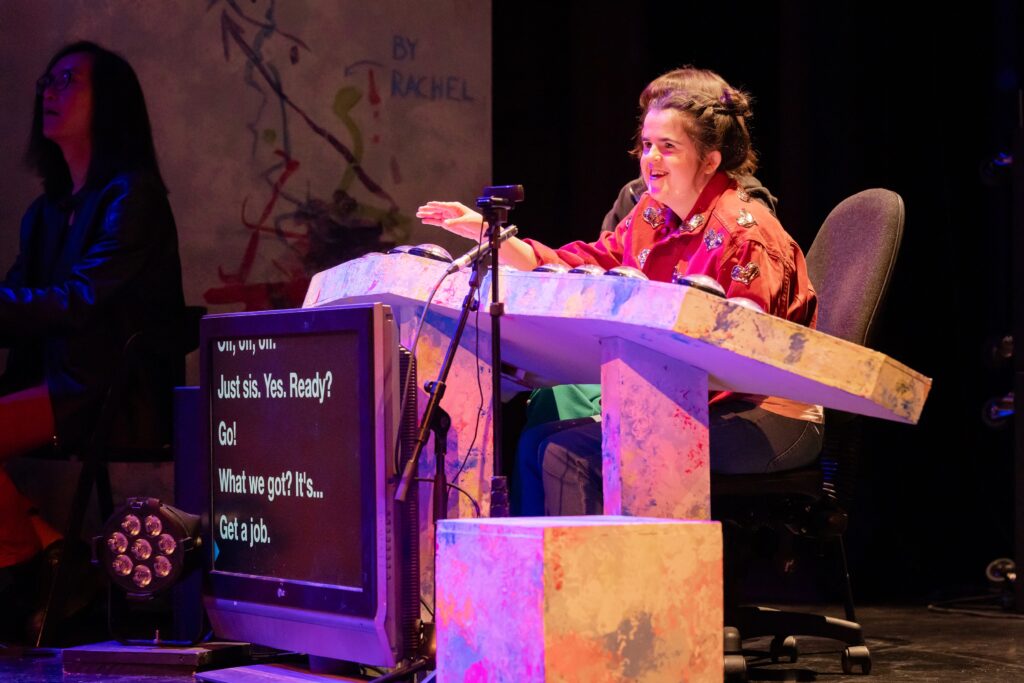
What might a normal night on stage look like? Have patterns developed as the show’s gone on, or is it still very random?
The second we think Rachel is giving us a pattern we can rely on, she switches it up. A big song and dance button she often used as a finale piece in the last run has become something she hits within the first fifteen minutes. What do you do with that as a cast?! We feel like we’ve danced a ‘finale’ of some sort. There’s still nearly an hour to go. Now what?! Iconic dramaturgy, in my opinion.
We’ve created dozens of new ‘buttons’ (scenes, stories, dances, games, videos) for this reiteration, and Rachel is still experimenting with where to put them. She spends a lot of the show reading the audience’s reaction before working out what comes next. She is unafraid of pauses and silence between each ‘scene’, and we have come to love those moments. Rachel is also a different director this time around. She interjects and live-directs far more, demanding total presence from the company at all times. We have to be ready to catch new ideas she might share with us mid-performance, and to realise them as best we can. Those are the moments I live for in the show. They are electric and terrifying and extra live.
What does it feel like for you being able to do this for your sister?
I think this show gets a lot of credit around what it does ‘for’ Rachel, and in a way, that is fair. Rachel’s life has changed in massive and molecular ways because of the nature of this year’s long journey with her in the driving seat as an artist. Since creating the show in 2022, across all aspects of her life, Rachel now makes more bids for connection, she asserts her decisions more clearly, she uses new language and she is more excited about meeting people and sharing herself with them, confident they might know how to hold that better, especially if they have seen her show.
It sadly IS radical to watch a learning disabled adult make so many decisions, and to have them honoured and elevated in this way. When I think about how little decision-making is encouraged in the lives of LD adults, and seeing the impact that agency and autonomy and community can have, I do feel very moved that this process has unfolded so beautifully around my sister, and how it leaks into every aspect of her life with us as a family, with her friends and at her care home. I guess the real work that’s been done is that the people around Rachel have learned how to stop demanding she steps into our world, and started getting better at stepping into hers.
But really, when I think more about this question, I don’t think the framing should be that we’ve done this ‘for’ Rachel. If anything, Rachel has done an enormous amount for me in the making of this show. I’m not trying to do a ‘gotcha’ or be outrageously politically correct in this answer. I sincerely mean that Perfect Show for Rachel has made me a better artist, a better director, and (I hope) a better person. Audiences haven’t seen a story like this before, and the theatre industry was missing out on an opportunity to spend time with a learning disabled artist who has so much to share and say and create. And that her show might be actually quite brilliant.
What responses have you had from audiences?
My favourite thing I’ve heard from audiences is that the show has made them wonder how they can show up more to the people in their lives who relate differently to ‘normative’ expectations in the world. I am moved every time somebody tells me that they wish their sibling/ friend/ colleague could have a version of Perfect Show. Whilst we can’t do Perfect Show for Rachel perfectly 24/7, it might be as simple as deciding to spend one hour in that headspace with the people that they love. How might a cup of tea with your nan with dementia feel different if you could just say ‘yes’ to the stories she tells you, as if they are art? How might it feel to walk with your toddler and stop and look curiously at every flower or rock they find fascinating? What wisdom might we find? I always worried that this show was too niche – who makes a show with one singular person in mind?! But I hope it’s niche specificity in meeting Rachel where she’s at, and how bizarre and novel that seems to feel, makes it clear that the world doesn’t tend to be perfect for most people. It proves it is possible to step away from normativity and start to address that balance in our lives.


Can you foresee Rachel having other productions in the future?
I honestly don’t know! I think from everything we have seen, she’ll very happily continue developing and directing this show for as long as venues will keep booking it. She loves it. We used to worry that Rachel might choose not to come to rehearsals, or the shows, and what we would do in that instance. Now, we tend to worry more about how to persuade her away at the end of each day.
However, Rachel isn’t only interested in being a director – she’s also into horse-riding, karaoke nights, going to the pub, swimming, chilled nights in with her and waving at boys she doesn’t know in the park. I think this show is in its own way, an ever evolving life work both for me and for Rachel.
The whole show carries on working on us even when we are not working directly on it. I’m not sure we’re going to get the privilege of witnessing Rachel’s Romeo and Juliet on a traditional theatre stage. But we might get to carry on working with her, imagining more and more ways to realise her vision as a vital, unique and consummate artist in her own right. Rachel would say ‘lucky Rachel’, I say ‘lucky me’.
Thanks very much to Flo for taking the time to chat with us about this utterly unique production. Perfect Show for Rachel runs at The Barbican, Pit from Friday 24 May to Sunday 9 June. Booking details can be found here.
 Everything Theatre Reviews, interviews and news for theatre lovers, London and beyond
Everything Theatre Reviews, interviews and news for theatre lovers, London and beyond
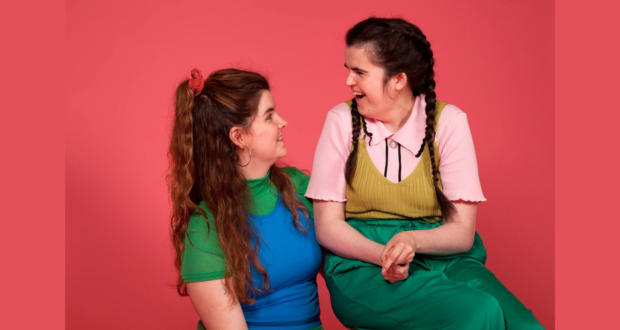

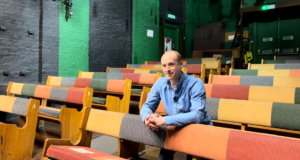
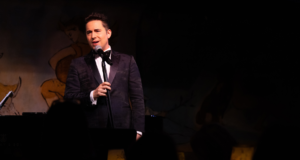
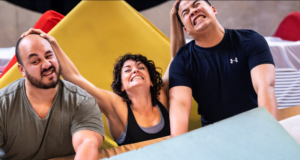
One comment
Pingback: Review: Perfect Show for Rachel, Barbican Centre - Everything Theatre